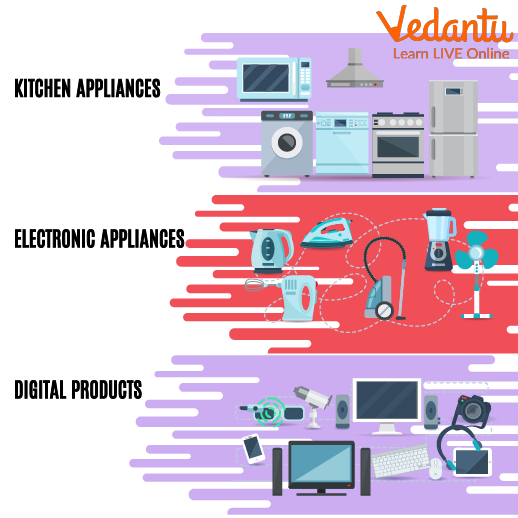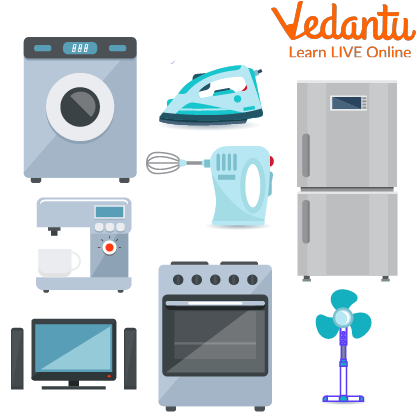




Important Electrical Appliance Terms, Definitions & Real-Life Examples
An electrical appliance is a tool or apparatus that we use in our day-to-day life with the assistance of electricity. For example, a ceiling fan, television, refrigerator, etc. are a few examples of electrical appliances. These appliances make life much simpler and save time. To perform their intended functions, electric appliances may also make use of one or more extraordinary engineering branches of the time.
Electrical, electronic, instrumentation, and so forth are among the technologies most concerned with electric devices. During our daily lives, electrical appliances or tools perform a variety of tasks or responsibilities.
Categories of Electric Appliance

Electrical Appliances at Home
Some of the usually named classes of electrical appliances at home are Household Appliances, Kitchen Appliances, Compact Appliances, Small Appliances, Floor-care Appliances, Personal-care Appliances, Consumer Appliances, Portable Appliances, Hand-held Appliances, Static Appliances, and Fixed Appliances. If you take a look at those category naming, one or more products in a category named can be observed in every other named category.
For example, a number of household home equipment can be discovered in Kitchen Appliances, Floor-care Appliances, and Consumer Appliances. Hence, it can be concluded that no particular categorization may be carried out within the world of Appliances.
Uses of Electricity in Our Daily Life
The uses of electricity in our lives are given below:
1. Home Appliances
Various electric devices at home and items that use energy range from fundamental items to advanced ones. These consist of small family gadgets, like an electric mixer, Iron box, and microwave to the large electrical appliances, like air conditioning devices, refrigerators, electric warmers, washers, dryers, etc. Also, the complete lighting fixtures at home are based on power.

Home Appliances
2. Transportation System
Only electricity makes it possible to travel to distant locations or communicate with people in other parts of the world. A power outage while flying can be dangerous. Metros work as an alternative to counteract the railway systems reliant on gas.
3. Industrial Uses
In today's generation, the industrial area is a tremendous power supplier. Without Power and Electricity, it would have been a dream to run factories, commercial machines, manufacturing techniques, and other numerous levels of activities. It is discovered that sudden energy shutdowns cause severe financial losses to companies that rely upon those factories and business machines. Thus, several industries are working to establish their power in factories, so they don’t need to outsource energy.
4. Commercial Usage
Many commercial homes like offices, hospitals, training centres, restaurants, shopping malls, authorities properties, police stations, etc. use energy. There are some sub-sectors beneath the economic area that require an infinite supply of power, such as hospitals and scientific facilities, and so on.
Fun Facts
One lightning strike might supply electricity for a year to 1000 homes. One second of lightning can produce up to 3 million volts of power.
Electricity moves at the same speed as light, or more than 186,000 mph.
In a power plant, steam from boiling water causes enormous wheels in a turbine to spin, producing energy. Electricity is produced by generators using the energy from rotating wheels.
Summary
Electricity has nowadays ended up as useful as oxygen for the survival of mankind. There are many uses of power. Some of them include use in the leisure industry, production enterprise, household paintings, healthcare, use as gasoline, etc., so mostly power is produced by means of burning fossil fuels.
Other strategies for producing electricity consist of wind generators, solar panels, dams, and so on. Energy is also utilised in other various fields. It is used within the production of chemical substances, to make light and heat, to make air straightforward for us to breathe, and so on. Today, electricity has come to be as essential as oxygen in our life.
FAQs on Facts About Electrical Appliances: Essential Guide for Students
1. What are some examples of common electrical appliances found in a typical home?
Common electrical appliances used in homes convert electricity into useful forms of energy like heat, light, or sound. As per the CBSE syllabus for 2025-26, understanding these examples is key. Some typical household appliances include:
- Television
- Refrigerator
- Washing Machine
- Microwave Oven
- Ceiling Fan
- Air Conditioner
- Electric Iron
- Water Heater or Geyser
- Mixer Grinder
- Computer
2. What are the main uses of electrical appliances in our daily life?
Electrical appliances have become essential in various sectors of our daily life. Their primary use is to make tasks easier, faster, and more efficient. Key areas of use include:
- At Home: For cooking (microwave), cleaning (vacuum cleaner), and entertainment (television).
- In Industries: To power heavy machinery, run production lines, and for large-scale manufacturing processes.
- In Transportation: Electric trains, metros, and modern electric vehicles rely on electrical systems.
- In Commercial Spaces: Offices, hospitals, and malls use electricity for lighting, air conditioning, computers, and medical equipment.
3. Why is it important to be careful while using electrical appliances?
It is crucial to handle electrical appliances with care primarily for safety. Electricity can be dangerous if misused. Improper handling can lead to electric shocks, which can be harmful or even fatal. Additionally, it can cause short circuits, which may damage the appliance or lead to a fire. Always follow the manufacturer's instructions and avoid using appliances with frayed wires or near water.
4. How do different electrical appliances convert electricity into other forms of energy?
Electrical appliances are designed to perform a specific energy conversion. The core function is to transform electrical energy into another useful form. For example:
- An electric bulb converts electrical energy into light and heat energy.
- A fan converts electrical energy into mechanical energy to rotate its blades.
- An electric heater or iron converts electrical energy into heat energy.
- A speaker converts electrical energy into sound energy.
5. What is the difference between an electrical appliance and an electronic device?
While the terms are often used interchangeably, there is a key difference. Electrical appliances generally convert electrical energy into other forms like heat, light, or motion (e.g., a toaster or a fan). Electronic devices, on the other hand, manipulate the flow of electricity to process information using components like microchips and transistors. Many modern devices, like a smart TV or a smartphone, are both electrical and electronic.
6. Is the electricity used by our appliances a renewable or non-renewable resource?
This is a common point of confusion. Electricity itself is considered a secondary energy source or an energy carrier, meaning it's generated from other sources. Therefore, the electricity we use is neither renewable nor non-renewable on its own. Its environmental impact depends on the primary source used to generate it. If it's generated from burning coal (non-renewable), it has a different impact than if it's generated from solar panels or wind turbines (renewable).
7. How does burning fuel at a power plant make a fan work in our home?
This process involves several stages of energy conversion and transmission. First, fuel like coal is burned at a power plant to boil water and create high-pressure steam. This steam pushes against the blades of a turbine, causing it to spin. The spinning turbine is connected to a generator, which converts this mechanical motion into electrical energy. This electricity is then transmitted through a network of power lines to our homes, where the fan's motor converts it back into mechanical energy to make the blades spin.
8. What is 'electric power' and how is it measured for appliances?
Electric power is the rate at which an electrical appliance consumes energy to do its work. It tells you how much energy the device uses per second. The standard unit for measuring electric power is the Watt (W), named after the inventor James Watt. You can often find the power rating in Watts mentioned on the appliance itself, which helps in understanding its electricity consumption.









